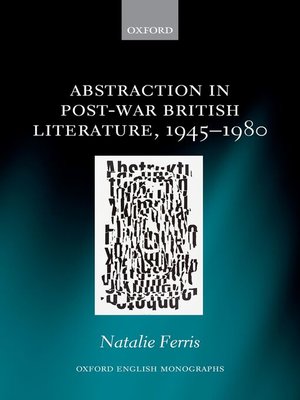Abstraction in Post-War British Literature 1945-1980
ebook ∣ Oxford English Monographs
By Natalie Ferris

Sign up to save your library
With an OverDrive account, you can save your favorite libraries for at-a-glance information about availability. Find out more about OverDrive accounts.
Find this title in Libby, the library reading app by OverDrive.



Search for a digital library with this title
Title found at these libraries:
| Loading... |
In a catalogue note for the 1965 exhibition 'Between Poetry and Painting' at the Institute of Contemporary Arts, the poet Edwin Morgan probed the relationship between abstraction and literature: 'Abstract painting can often satisfy, but "abstract poetry" can only exist in inverted commas'. Language may be fragmented, rearranged, or distorted, abstract in so far as it is withdrawn from a particular system of knowledge, but Morgan was of the mind that to be wholly 'disruptive' was to deprive a poem of its 'point' as an 'object of contemplation'. Whilst abstract art may have come to fulfil or or fortify an impression of post-war taste, abstraction in literature continued to be treated with suspicion. But how does this speak to the extent to which Britain's literary culture was responsive to progress compared to its artistic culture? Abstraction in Post-War British Literature 1945-1980 traces a line of literary experimentation in post-war British literature that was prompted by the aesthetic, philosophical and theoretical demands of abstraction. Spanning the period 1945 to 1980, it observes the ways in which certain aesthetic advancements initiated new forms of literary expression to posit a new genealogy of interdisciplinary practice in Britain. At a time in which Britain became conscious of its evolving identity within an increasingly globalised context, this study accounts for the range of Continental and Transatlantic influences in order to more accurately locate the networks at play. Exploring the contributions made by individuals, such as Herbert Read, Ian Hamilton Finlay and Christine Brooke- Rose, as well as by groups of practitioners. It brings a wide range of previously unexplored archival material into the public domain and offers a comprehensive account of the evolving status of abstraction across cultural, institutional, and literary contexts.






